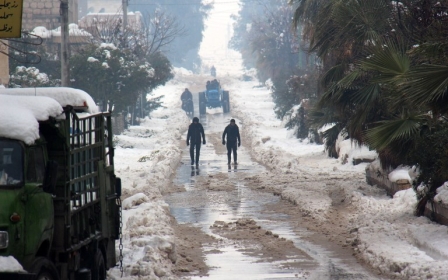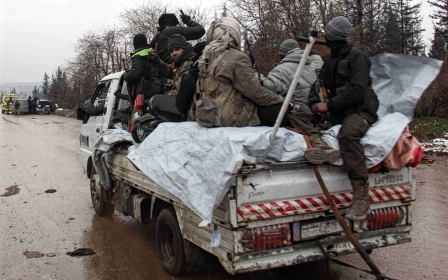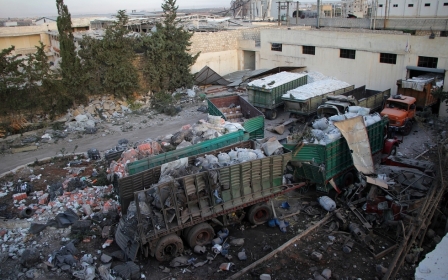Aleppo falls to Assad forces as Russia plans Syria ceasefire talks

Russia has announced plans to discuss a nationwide Syrian ceasefire with Turkey and Iran in January, a day after the Syrian army declared the city of Aleppo retaken and a pivotal victory against "terrorism".
Russia's deputy foreign minister, Gennady Gatilov, was quoted on Friday by the Interfax news agency as saying talks would take place in the middle of January.
President Vladimir Putin said on Friday that after the ouster of rebels from Aleppo, Moscow will now look to end fighting across the country, Russian news agencies reported.
"Everything needs to be done for fighting to stop on all Syrian territory," Putin was quoted as saying.
"In any case, we will strive toward this,” Putin added.
Putin described the recapture of the devastated city of Aleppo by Syrian regime forces as a "very important" step towards stabilising the war-torn country.
"The liberation of Aleppo from radical elements is a very important part of the normalisation in Syria, and I hope, for the region overall," Putin told defence minister Sergei Shoigu in a meeting, Russian news agencies reported.
Shoigu said the evacuation of rebel fighters from Aleppo was complete, creating the conditions for a ceasefire deal in Syria, the RIA news agency reported.
"In my view we are very close to achieving an agreement on a full ceasefire across the territory of Syria," Shoigu said at the meeting with Putin.
The foreign and defence ministers of Russia, Iran and Turkey held talks on Syria in Moscow on Tuesday after which they said they were ready to help broker a Syrian peace deal.
The United States sought to downplay its absence, saying it was not a "snub" and did not reflect a decline of US influence in the Middle East. Donald Trump is due to be inaugurated as the new US president on 20 January.
Gatilov said Russia was not in touch with the incoming US administration over Syria, but saw Trump as a better negotiating partner than Barack Obama.
He added Trump had never called for the removal of the Syrian president, Bashar al-Assad. "As we understand it, that means he has more room for manoeuvre than the outgoing administration of Obama."
United Nations Syria mediator Staffan de Mistura has said he intends to convene separate peace talks in Geneva on 8 February.
Russia says its talks would "complement" rather than compete with the UN.
The loss of east Aleppo is the biggest blow to Syria's rebel movement in the nearly six-year conflict, which has killed more than 310,000 people.
It puts the government in control of the country's five main cities: Aleppo, Homs, Hama, Damascus and Latakia.
Because of the intensity of global rivalries - particularly between Russia and the United States - the international community struggled for years to respond to the bloodshed in Syria.
"The liberation of Aleppo is not only a victory for Syria but also for those who really contribute to the fight against terrorism, notably Russia and Iran," state news agency SANA quoted Assad as saying before the army announcement on Thursday.
Assad's suppoters celebrated the fall of Aleppo with government forces and allied militias. Pro-government media published videos of what it said were celebrations in the city.
Celebratory gunfire began to erupt and crowds began to fill the streets as soon as the army announced the last rebels had left east Aleppo.
"We've been waiting five years for this. We have suffered, what with the rebels, the water shortages and the power cuts," said Rana al-Salem, 29.
The evacuation effort had been hampered by heavy snowfall and freezing temperatures, leaving evacuees waiting in unheated buses for hours.
"Overnight between Wednesday and Thursday, in one of the last stages of the evacuation, more than 4,000 fighters were evacuated in private cars, vans and pick-ups from eastern Aleppo," said Ingy Sedky, the spokeswoman in Syria for the International Committee of the Red Cross.
She said about 34,000 people had left rebel areas of Aleppo under the plan.
Pivotal moment
Jens Laerke, spokesman for the UN humanitarian agency, said 31 staff had been assigned to monitor a crossing point at Ramussa, the government-held district of southern Aleppo through which evacuation convoys have been leaving.
"It's been a very difficult night. The weather is really harsh, and people are leaving in hundreds of private vehicles at different levels of disrepair," he told AFP.
Heavy snowfall since Wednesday, which blanketed Aleppo and the surrounding countryside, had slowed down the evacuations.
"The bad weather, including heavy snow and wind, and the poor state of vehicles... mean things are moving much more slowly than expected," Sedky said.
Rebel forces, who seized control of east Aleppo in 2012, agreed to withdraw from the bastion after a month-long army offensive that drove them from more than 90 percent of their former territory.
The deal was brokered by Russia, which launched air strikes in support of Assad's government last year, and Turkey, which has supported some rebel groups.
As part of the Aleppo evacuation deal, it was agreed some residents would be allowed to leave Foua and Kefraya, two Shia-majority villages in northwestern Syria that are under siege by the rebels.
About 1,000 people have been able to leave the villages in recent days.
The evacuation of Aleppo's rebel sector is a pivotal moment in a war that has triggered a major humanitarian and refugee crisis.
As well as a major strategic gain for Assad, the rebel withdrawal from Aleppo has given fresh impetus to international efforts to end the conflict.
Russia, Iran and Turkey agreed this week to guarantee Syria peace talks and backed expanding a ceasefire, laying down their claim as the main powerbrokers in the war.
Middle East Eye propose une couverture et une analyse indépendantes et incomparables du Moyen-Orient, de l’Afrique du Nord et d’autres régions du monde. Pour en savoir plus sur la reprise de ce contenu et les frais qui s’appliquent, veuillez remplir ce formulaire [en anglais]. Pour en savoir plus sur MEE, cliquez ici [en anglais].




